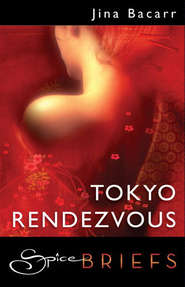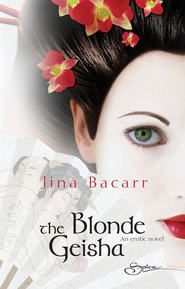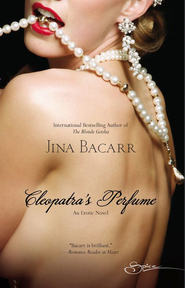По всем вопросам обращайтесь на: info@litportal.ru
(©) 2003-2024.
✖
The Blonde Samurai
Автор
Год написания книги
2019
Настройки чтения
Размер шрифта
Высота строк
Поля
I nurtured my instinctual attraction to lace and silk with frequent trips to the House of Worth in Paris, as well as art galleries and museums, to achieve a new level of refined smartness. My unique sense of taste and fashion matured like a ripening fruit, my raw talent at the core sweetening my outer skin with a prettiness I’d never felt before, whether I was tipping my ivory lace parasol at a cocky angle while flirting with Lord—at a garden party or slipping on my third pair of lamb-white kid gloves since morning before sitting down to afternoon tea at Brown’s with the duchess of—.
This new courage I found meant I could assert myself, flaunt my skill at repartee, show off my knowledge of world politics and play the game as the men did. I was a notable player in this milieu of the high-society hostess.
And I had no intention of giving it up.
4
I replaced the dildo among the red velvet folds hungry to hug its hardness, then wiped the stickiness off my fingers with a cotton handkerchief monogrammed with my initials. The perfume of my folly lingered to tempt me, but I snapped the box shut. I had no time to linger. Tonight I would entertain visitors.
Important visitors.
At James’s request, I had invited the Viscount and Lady Aubrey to join us for a light supper along with my parents (my mother was eager to make the acquaintance of Lady Aubrey, a lady-in-waiting to the queen). The viscount was a family friend of his lordship and quite an interesting gentleman. No doubt you will have guessed his identity before you turn the page. He has the ear of the queen on foreign affairs and reputedly has been invited to Windsor Castle by Her Majesty to see her personal collection of miniatures. I was impressed with his keen sense of politics and I was certain he had no idea James was a scoundrel. His lordship was very adept at keeping his father’s friends unaware of the dark side of his personality.
I planned a simple menu starting with a clear soup and two entrées instead of the usual four, followed by a dish of duck and ending with creamy pudding and light airy confections smothered with cream. Nothing to tax the digestion, since I knew the viscount suffered with gout.
Dissention set in when my husband informed me he wished to speak to my father alone after dinner about something important. I should have known James never did anything without wanting something in return. What was it this time? I wanted to know. He ignored my outburst and disappeared upstairs “to polish his leather toys.” I wasn’t fooled by his diversionary tactics to take my mind off the situation. I had no doubt the entire visit was a thinly disguised plot for James to elicit more funds from my father for his costly lifestyle.
What I couldn’t have foreseen was a chance remark from the Viscount Aubrey that enchanted me and planted a seed in my mind that grew so quickly I couldn’t stop it, as surely as I couldn’t stop the shadows of night from descending upon us.
“I don’t know what’s gotten into the British government, James,” I overheard my father saying after dinner when I entered the room filled with smoke, “opening the railway in Japan before fixing the damn roads.”
James agreed, his easy compliance making me certain my suspicions about his motives were correct. He added that the roads were muddy and unruly and nearly impossible to travel in wet weather. Neither he nor my father noticed my entrance, so involved were they in their conversation, but the Viscount Aubrey stole a glance in my direction, his bushy eyebrows moving up and down in a curious twist. I imagined he wasn’t accustomed to a lady joining the gentlemen in their frog-trimmed, padded smoking jackets after dinner in the gun room, but I insisted upon it. I had no desire to accompany my mother and Lady Aubrey upstairs with their fluttering fans, bottles of scent, filmy scarves and innocuous talk about croquet, archery and the latest divorce gossip. Nothing that would raise an eyebrow or illicit a nervous cough.
“There was little the British government could do, sir,” James insisted, offering my father a cigar, “since the Japanese government demanded the railroad between Tokio and Yokohama open on time.”
“That project was started more than two and a half years ago,” my father said, leaning back in the padded wingback chair, enjoying its comfort as well as its girth. It did my heart good to see my da enjoy himself, knowing how much turmoil he’d faced these past few years. “Since then, the funds to build more railway lines in Japan have either dried up or been withdrawn.”
“It’s no secret, Mr. O’Roarke, that the situation is at an impasse,” added the viscount, his smoking cap slightly askew on his head. He reminded me of an overgrown elf. “The cost to build more railways in Japan is prohibitive, especially with the financial state of European banks.”
“With all due respect, Viscount Aubrey,” said my father, sticking his thumbs under his plaid suspenders as he always did when he was certain he was right, “I’d bet a barnful of hay the cost could be kept down if you Brits paid more attention to your suppliers. I hear these fellows use twisted rails and build weak bridges.”
“What you say is true,” James added, his manner somewhat condescending, which made me even more suspicious, “but the biggest mistake was that the European director of the railway didn’t know how to handle the Japanese.”
“And I suppose you do, milord?” my father inquired, biting down on his cigar.
“To put it bluntly, sir, yes,” James said with a confidence that surprised me. “I’ve become acquainted with their way of thinking, how they move together as one unit, not individuals. How they use a subtle form of communication when dealing with westerners and never answer a question in a direct manner.”
My father laughed. “Back home we call that hedging.”
“The Japanese call it business as usual,” James answered in a glib manner. He smiled like a little boy trying to fool his governess. I looked away, refusing to be drawn into his game.
“Then you’ve been to Japan?” my father asked, surprised.
“No,” James said, “but I’ve been escorting the Japanese emissary around London. He’s a likable chap with a solid knowledge of English and a good head on his shoulders.”
Escorting him to the brothels on York Street and the newly fashionable Bayswater district, I imagined, easing myself down on a plush divan after pouring an after-dinner drink from the row of decanters of claret, port and sherry sitting on the sideboard.
I leaned forward, eager to jump into the conversation. I thrived on lively discussion, from a rousing round of politics, discussing the iniquities of the parties—whether they were Tory or Whig or Labor—to current books and plays. This evening I was eager to discuss the latest filibustering in the House of Commons. I had no desire to listen to their mindless prattle about Japan, a barbaric country where, according to what I’d read in Lord Penmore’s letters, packhorses were the choice of transportation, carrying items for trade from city to city by means of narrow footpaths cut into fields of farmland.
“The Japanese will beat us at our own game if we don’t beat them first,” my father bellowed, his stiff celluloid collar choking him and turning his face red. I had to smile. I knew he’d rather be lifting a pint with his cronies in a pub. He hated the formalities required of an English drawing room, while my mother reveled in it.
“What are you saying, Mr. O’Roarke?” the viscount asked, his eyes stealing a glance at me when he thought I wasn’t looking. I tipped my glass to him and smiled. His features softened and he returned the smile.
“The Great Western Railway from here to Swindon barely tops fifty-three miles an hour and it took you British years to build it.” He looked at my husband and grinned. “I’m certain we can build a railway from ōzaka to Kobé in half the time. And my son-in-law has convinced me he’s the man to handle the deal.”
So that was the reason James invited my father for this get-together.
Angry with my husband’s subterfuge, I fiddled with my fan, bending it until it cracked. James had convinced my father there was a fortune to be made by working with the mikado’s government to finance a string of railways across Japan with Thomas O’Roarke investing in the rails, tank engines, wood for bridges and carriages needed. All financial arrangements, his lordship added, would be handled through the Oriental Bank of London.
He didn’t count on his frustrated young wife playing a game of her own. Bored, restless and sex starved, I remained defiant in my approach to this marriage. I refused to be treated like an aftereffect of his greed and often baited him with subtle, sexual innuendos regarding his secret life.
As in this instance, when Viscount Aubrey dropped a casual remark that the British government held fast to its goal in bringing Occidental values to Japan. Curious, I asked him how they proposed to change a pagan country cut off from civilization for nearly two hundred fifty years (Lord Penmore’s letters contained material of an informational nature as well as salacious). He answered in his wry manner that the British Legation had already engaged a governess and a seamstress to teach the female gentry of Japan about English household customs.
“I imagine visiting the mysterious Orient tempts the adventurer in all of us,” I said, envisioning myself floating in a world of silk, flowers and fans. And bare breasted with numerous combs and needles decorating my hair, as I had seen in the tinted photographs of the geisha included in Lord Penmore’s letters. “Including me.”
“I had no idea you were so interested in Japan, my dear wife,” James said, laying his hand on the back of my neck and rubbing it, making me stiffen. “I see I was mistaken.”
He kissed my hand, expecting me to quiver. I didn’t withdraw it, signaling to him that I alone controlled my emotions. Instead, I said, “There are many things you don’t know about me, my dear husband.”
“That’s my Katie,” my father said, smiling at me. “A girl with spirit. I see no reason why you couldn’t accompany your husband to Japan.”
“Splendid idea, Mr. O’Roarke,” the viscount added, as if the thought were his own. “Your daughter would be a most excellent addition to the British delegation at the mikado’s court.”
“That’s impossible, milord,” James blurted out, startling me.
And making me angry. How dare he speak for me?
He continued, “My wife has no intention of leaving London during the Season.”
Ignoring his outburst, I replied, “You flatter me, Viscount Aubrey, but tell me, how could I be of assistance to the legation? I know nothing about the Japanese, though I admit I’ve been reading about their fascinating country in Lord Penmore’s letters to my husband.”
The look of fury on James’s face was instant. Cold, fierce. I swear if he could have, he would have taken the whip to me at that moment so intense was his anger toward me.
I pretended not to notice and continued discussing the British alliance with the Japanese with the viscount, though I was more interested in contrasting the volatile state of my relationship with my husband with my seemingly innocent remark about the romance of travel.
“I’m certain the mikado’s court would be honored to receive you and be graced by your wit, Lady Carlton,” said the viscount, ignorant of the drama being played out between my husband and me, “as well as your charm and intelligence.”
I smiled. I was beginning to enjoy the game. I curled my fingers around my broken fan and tapped it against my cheek in a coy manner. “In that case, how can I resist such a delightful invitation?”
“What are you saying, my dear wife?” My husband’s voice held an edge only I recognized.
I lowered my lashes to veil my naughty thoughts from him. “Isn’t it a wife’s duty to accompany her husband to his new post?”
“Not if he wishes her to stay home,” he countered. “A wife must obey her husband’s wishes in all matters.”
“All matters, James?” I flipped open my cracked fan and fluttered it about me wildly. “This wouldn’t be the first time I’ve gotten my way, would it, my dear husband?”
I could see his eyes flashing with contempt, knowing I had baited him and he couldn’t bow out gracefully in front of Viscount Aubrey.











